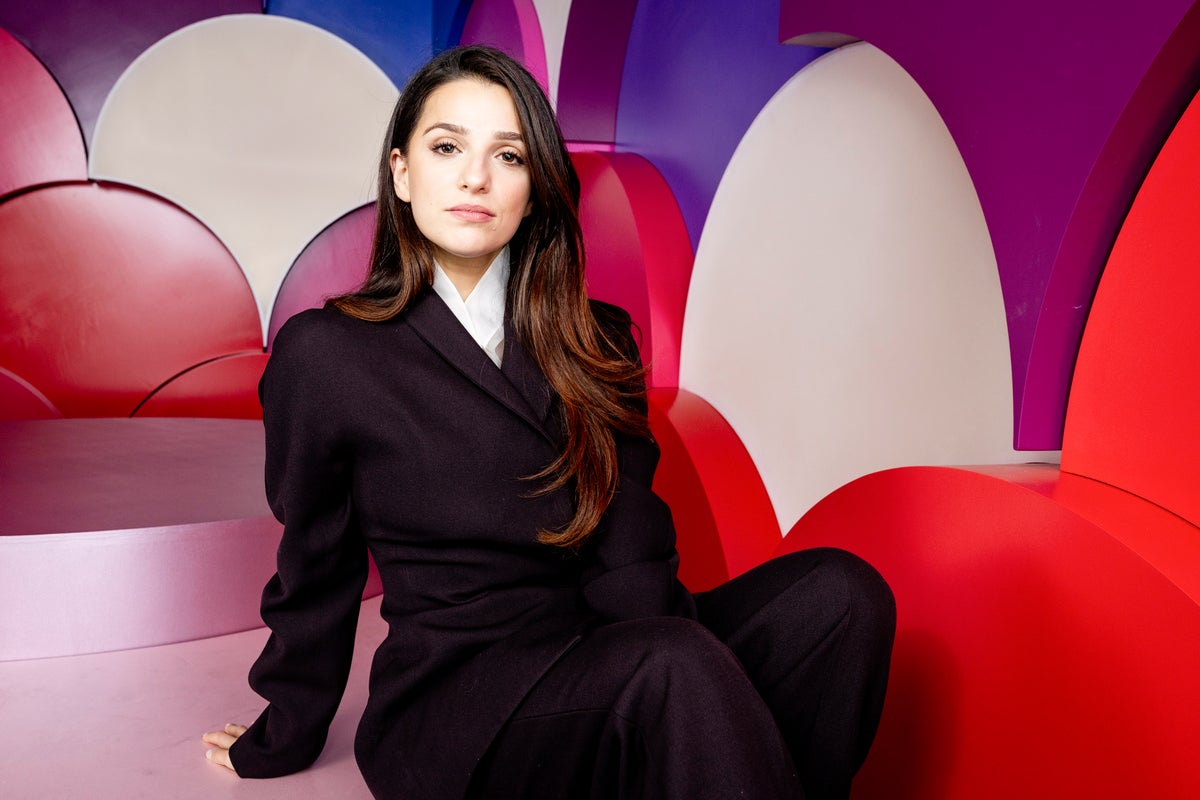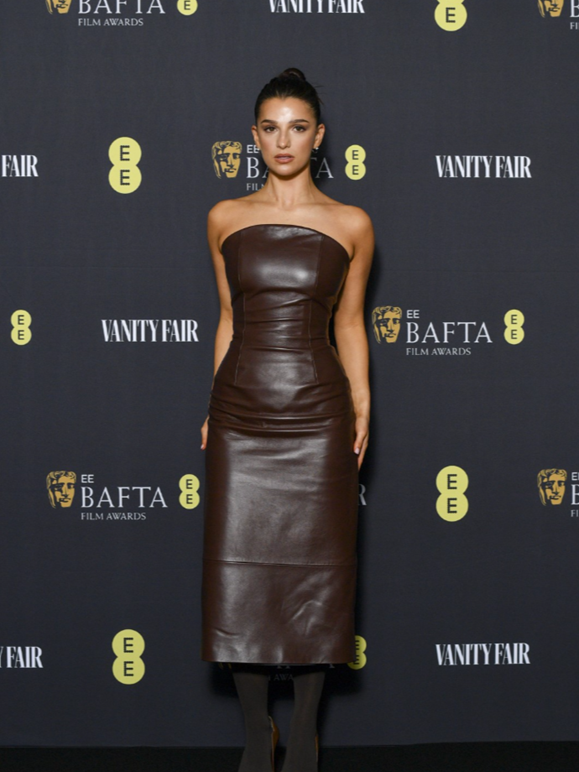
Playing Amy Winehouse was never going to be easy. But Marisa Abela didn’t expect a film about the singer’s life to prompt such an incendiary reaction. “That job was a real learning curve for me,” says the 28-year-old who starred as the late musician in Sam Taylor-Johnson’s 2024 biopic. Back to Black told the story of Winehouse’s rocketing rise to success and her well-publicised battle with addiction, as well as her on-off relationship with Blake Fielder-Civil, played by Jack O’Connell. Abela, who, like Winehouse, is of Jewish heritage, captured her wild contradictions, and although the critical response took issue with the ethics of the project, many reviewers praised the unexpected tenderness in its lead performance.
It’s fair to say, though, that the film itself was eviscerated by fans, many of whom dismissed it as a posthumous exploitation of the singer that reinforced her story as one of victimhood and abuse. Others argued it did the opposite, spending too long romanticising Winehouse’s relationship with Fielder-Civil, who many blame for introducing Winehouse to heroin, while sanitising the darker and more tragic aspects of her life – the musician died of alcohol poisoning at the age of 27. There was also scepticism around the decision not to use Winehouse’s vocals in the film, which had been made by Taylor-Johnson after she heard Abela sing. Although not a trained musician, Abela spent four months learning to sing like Winehouse alongside learning to play the guitar. She also spent hours in the makeup chair every day, transforming into the role: Sixties-inspired beehive hairdo, winged eyeliner, swirling shoulder tattoos.
“You can’t help but take things incredibly personally, whatever someone’s intent is,” she says of the film’s reception. “I think some people do mean for you to take it personally and some don’t. But things did start to feel a bit scary, like when some of the first tabloid articles were coming out.“ Abela’s vocals were called into question, as was her physical resemblance to Winehouse. ”I just turned my phone off,“ she says. ”I also deleted Instagram for about six months.”
Until that point, Abela’s work had largely been critically acclaimed, most notably her role as the investment banker Yasmin Kara-Hanani in HBO’s Industry, which was her first gig out of drama school. The show, about a group of sexed-up young graduates entering the finance world, launched in 2020; it’s recently been renewed for a fourth season. Her character appeared in minor scenes of nudity in the first season, but Abela didn’t agonise about taking her clothes off. “I’d never spent a day in the gym. I ate whatever I wanted. I was young and healthy, but I simply wasn’t obsessed with my body. I really didn’t care. My biggest concern was that my colleagues thought I was a good actress. That’s all I cared about.“
She does admit, however, to feeling anxious about the reaction it would prompt. “I was worried I’d get some kind of criticism because of the nudity. But that didn’t happen.” As a result, she felt armoured going into filming Back to Black. “I got a bit... I don’t want to say cocky, but I just didn’t worry about what people were going to say about something I was doing. Of course, I knew that people would have opinions about there being an Amy Winehouse biopic, let alone whoever plays her,” she says, “but I don’t think I quite prepared for everything that happened.”
We’re speaking today over Zoom because Abela has been nominated for Bafta’s EE Rising Star award; the winner will be announced at Sunday’s award ceremony. In conversation, she is as effusive and enthusiastic as you’d expect a young star at the beginning of a promising career to be – everything is “exciting” and “amazing”. She embodies none of Yasmin’s iciness but does retain a measure of the heiress’s poise.
She was walking to a friend’s house in London, where she lives with her fiance, the actor Jamie Bogyo, when she got the call to say she’d been nominated for the award. “It was crazy because I couldn’t tell anyone for a while,” she recalls. “So I didn’t really feel it until the announcement and then it all got very exciting very quickly.”
Life moves fast for Abela, who grew up in the seaside village of Rottingdean with her older brother Jack; like Yasmin and Winehouse, her parents separated when she was young.

She was just 21 and in her final year at Rada when the audition for Industry came along. By the time she graduated, she’d filmed the first two episodes. The series blows open the jittery, febrile hothouse environment of high finance where the players are best described as perpetually high, except the drug is consistently changing. Sometimes it’s enough cocaine to knock their nostrils out. Other times it’s a threesome with colleagues. But most of the time, it’s money. Heaps of it. Industry was initially a sleeper hit but by its third season, which came out last year, it had reached revered status among critics and fans. That latest series earned a place on almost every publication’s best TV shows of the year roundup; The New Yorker put it at number one.
In many ways, season three belonged to Yasmin. Her ambiguously abusive relationship with her tyrannical, oleaginous father, Charles Hanani (Adam Levy), reached an appalling apex on a yacht when Yasmin found him having sex with a young employee on her bed. A heated argument resulted in Charles falling into the sea as Yasmin watched, choosing not to save him. A subsequent financial scandal left her fending off paparazzi while coming to terms with a trauma so disturbing the show never explicitly spells it out. “If you were to have this character sit on a therapist’s chair, it might have taken her the equivalent of three seasons to talk about what had happened to her,” explains Abela, who brings a winning fragility to the otherwise avaricious Yasmin. “I also love that it’s not completely explicit. It’s clear that her relationship with her father was incredibly abusive, and I have my own ideas about what that means but I think it’s great that everyone has a different take.”
Abela went into shooting season three of Industry a week after wrapping Back to Black. “I thought it was easier to go from one straight into the next at the time,” she says. “But the truth is Back to Black was difficult to shake off. I felt like I was behind a wall of cellophane. It took months to feel normal again.”
Part of what made playing Winehouse so taxing was the weight loss the role required – towards the end of her life, Winehouse weighed just seven stone. Abela worked with a dietician to lose the weight safely but has revealed how fellow actors started complimenting her slimmer figure, while designers who’d never previously been in touch started offering her clothes to wear.
It’s hard to un-hear someone saying ‘you look amazing’ when you know your body is in an unhealthy and unsustainable place
“I knew I was losing weight for a part and so I felt like I had a lot of autonomy over my body and the choices I was making,” she says. “But when other people start commenting on it, that’s when it becomes difficult because it’s hard to un-hear someone saying ‘you look amazing’ when you know your body is in an unhealthy and unsustainable place. That is really confusing because then when you need to put that weight back on, it’s so hard to pretend like those conversations haven’t happened.” Does she think we’ve moved forward at all in terms of body positivity? “No. I think [the proliferation of] Ozempic really shows that. I don’t think it’s the individual’s fault but women want to be thin. And in this industry...” she trails off. They’re rewarded for it? “Exactly.”
There are further projects on the horizon for Abela, including Black Bag, a forthcoming spy thriller from Steven Soderbergh also starring Cate Blanchett and Michael Fassbender – and something else “really different” to anything she’s done previously.
It has also been a big year for reasons outside of her career. “I got engaged and did a bunch of life stuff,” she says, referring to her relationship with Bogyo, who was born in America and originated the role of Christian in the West End production of Moulin Rouge. The couple met at drama school and will be married in a ceremony later this year. “I had this voice in my head that’s like, you’ve got to be in really good shape for that’,” she says, rolling her eyes.

Like many women, Abela’s relationship with her body has changed with age. Her friends, for instance, have started talking about whether they want children. “As a woman, you feel for so long that your body’s function is to be attractive and you become obsessed with that functionality in an annoying, animalistic way until you find a mate. Then you get that person and you’re like, OK, does my body work?“ Abela continues. ”We’re constantly having to look at our bodies as this thing that serves us in one way or another, which is an issue that – I’m sorry but – most men just don’t have to worry about.”
Abela has reason to be more grounded about this than most of her female peers. In 2020, she was diagnosed with thyroid cancer at 23. After undergoing an eight-hour operation and radioactive iodine treatment, she gained a long scar on her neck – and a new outlook on life. “It was the first time that I felt like my body was its own thing, and I’d been abusing it by being nasty and critical,” she says. Two days after the surgery, the first episode of Industry came out. “I was like, what the hell is going on? It was crazy.” But perhaps not so crazy given what she had just gone through? “I know it sounds so cliche but when you get a diagnosis like that, it does change your perspective. I think I have a better ability to see a situation for what it is rather than get swept up in unimportant things.”
Voting for the EE Rising Star award is open at ee.co.uk/Bafta until noon GMT on Friday 14 February. The winner will be announced at the EE Bafta Film Awards on Sunday 16 February







